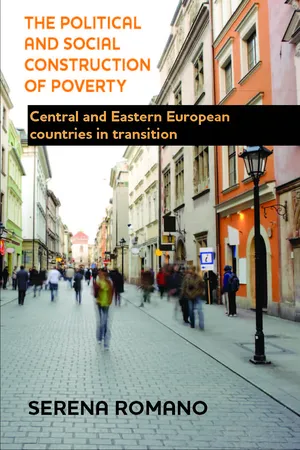
- 272 pages
- English
- PDF
- Available on iOS & Android
About this book
Poverty is not a neutral phenomenon, nor are social inclusion programmes neutrally conceived, designed and implemented.Their ultimate nature is built upon ideas, values, actors, politics and economic constraints.This topical book is one of the first to examine the social and political construction of anti-poverty programmes in Central Eastern Europe and their transformation from communist rule to the current economic crisis. It covers the approach towards the 'parasite' poor through to Guaranteed Minimum Income Schemes and illustrates how the distinction between different categories of 'deserving' and 'undeserving' poor has evolved over the years as the result of changing paradigms, combined with the pressure exerted by domestic and international actors, the European Union and the World Bank among others. This text breaks new ground for social policy students and scholars interested in understanding how differently post-communist welfare states have represented, legitimised and dealt with poverty, need and social justice in accordance with divergent normative frameworks constructed at national level.
Frequently asked questions
- Essential is ideal for learners and professionals who enjoy exploring a wide range of subjects. Access the Essential Library with 800,000+ trusted titles and best-sellers across business, personal growth, and the humanities. Includes unlimited reading time and Standard Read Aloud voice.
- Complete: Perfect for advanced learners and researchers needing full, unrestricted access. Unlock 1.4M+ books across hundreds of subjects, including academic and specialized titles. The Complete Plan also includes advanced features like Premium Read Aloud and Research Assistant.
Please note we cannot support devices running on iOS 13 and Android 7 or earlier. Learn more about using the app.
Information
Table of contents
- THE POLITICAL AND SOCIAL CONSTRUCTION OF POVERTY
- Contents
- List of figures
- Acknowledgements
- Preface
- Part One: The construction of poverty before 1989
- 1. Social policy in Central Eastern Europe
- 2. The lifespan of a model: the construction of poverty before 1989
- 3. Poverty in transition
- Part Two: Poverty and welfare reforms after the transition
- 4. East meets West: CEE countries, monetary institutions and the European Social Model
- 5. The new poor in the new Europe: the end of a stigma?
- 6. The construction of poverty in times of austerity
- Conclusions
- References
- Index